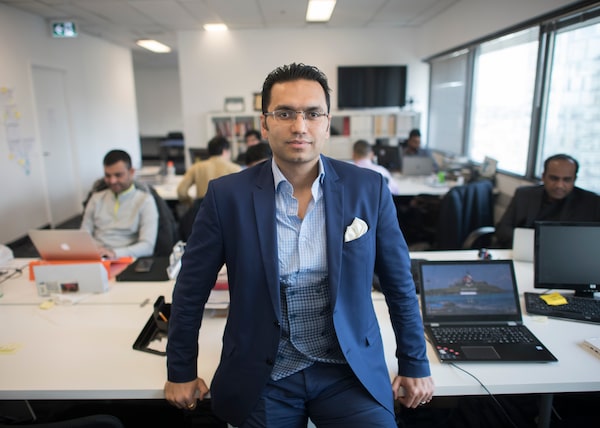
Kundan Joshi, CEO of TheAppLabb, seen here on Jan. 16 2020, was among numerous company founders who got actively involved in the effort to find both Nudge.ai and Planswell employees their next place of employment.Fred Lum/The Globe and Mail
When Canadian robo-adviser Planswell shut down last fall, the startup community reacted swiftly on social media, offering both sympathy and opportunity to the dozens of people suddenly out of work. Posts on Twitter and Facebook from startup founders and recruiters encouraged Planswell employees to reach out to them to find their next gig.
A similar story played out when Toronto-based Nudge.ai, which had developed a sales platform using artificial intelligence, announced last week that it was shutting down. The company posted bios of its employees available for hire, alongside glowing descriptions of their skills.
It has become increasingly common in the Canadian startup scene that, when companies fail, there’s an outpouring of support on social media for the affected employees, with other companies rushing in to hire.
Kundan Joshi, chief executive officer of Toronto-based mobile app development company TheAppLabb, was among numerous company founders who got actively involved in the effort to find both Nudge.ai and Planswell employees their next place of employment.
TheAppLabb interviewed about half a dozen ex-Planswell employees (and is considering hiring some of them) and also referred a handful to other startups. With Nudge.ai, Mr. Joshi posted on the Facebook group Startup North that his company is hiring and was looking to connect with out-of-work employees, while also offering his ear for anyone who wanted to talk.
“The entrepreneur community is very important for us … and it’s important for us that the community stays strong and keeps building its successes from the Canadian story point of view,” said Mr. Joshi. “As a community, it’s important we throw in as much shield and cushion as possible" to protect it.
Mr. Joshi acknowledges the efforts aren’t just to benefit employees, but the startups as well. “As much as the companies want to take care of each other … we are also looking for good talent.”
He says employees laid off from failed startups don’t just have the technical skills other firms need, but also the experience of seeing what can go wrong at a company – and possibly help prevent it at their next gig.
“They have had a perspective or had a closer outlook as to what went wrong in an organization … and learned from the errors that were made or the situation that was created,” Mr. Joshi says. “You can’t buy those experiences.”
Erin Bury, CEO of Final Blueprint Inc., a Toronto-based online estate-planning company operating as Willful, says it’s accepted in the startup world – by both founders and employees – that not every company will make it.
"It’s never a happy day when conducting layoffs … but it probably provides some hope for founders that the community is pitching in and their people will be okay,” says Ms. Bury, who recently hired a software developer laid off by Planswell.
For founders, hiring from a pool of laid-off workers is also a good way to get employees without poaching from fellow startups, particularly when founders are often friends or acquaintances in close-knit communities like Toronto.
"I don't want to ruin or affect personal relationships by going after their people," Ms. Bury says.
Hiring recently laid-off employees can be more competitive than trying to poach them, Ms. Bury adds, since other founders are also looking to hire from the same newly available talent pool. In other words, the hires don't come at a discount.
"Not only do I want to be a founder that pays employees a good wage, but I know there are five founders lined up behind me that would be happy to offer them what they're worth if I tried to underpay them,” she says.
Many former Planswell employees were also careful about what job they took next. Ms. Bury says those she interviewed had a lot of questions about how Willful is funded, the revenue model and its long-term growth strategy.
"If you've been burned by a startup, you really want to be careful getting into another startup," she says.
Software developer Andrew Segal said he was both “sad and anxious” about his future after being laid off at Planswell last year, which was his first development job after a career change from industrial design. He was optimistic, though, after seeing the plethora of postings on social media from startups looking for employees or offering referrals.
“I reached out to a bunch of people on that thread and heard back pretty quickly and had some good conversations with companies because of it,” he says.
After weeks of conversations with recruiters and about a dozen interviews at both startups and longer-established companies, Mr. Segal took a job at Willful and started on Jan. 6.
VarageSale released a list of 22 employees who lost their jobs when the online marketplace was acquired by Toronto-based VerticalScope in late 2017.
“Unfortunately, some very talented people won’t be joining as part of the acquisition. With their permission, I am sharing their names and contact info,” VarageSale co-founder Tami Zuckerman posted in the Startup North Facebook group at the time. The list was also published on LinkedIn.
Some staffers got interviews the day after that post and for days and weeks following. Some had more than a dozen interviews. Ms. Zuckerman says everyone on the list who wanted another job right away was hired within weeks.
“They had their pick. It was really great,” she says.